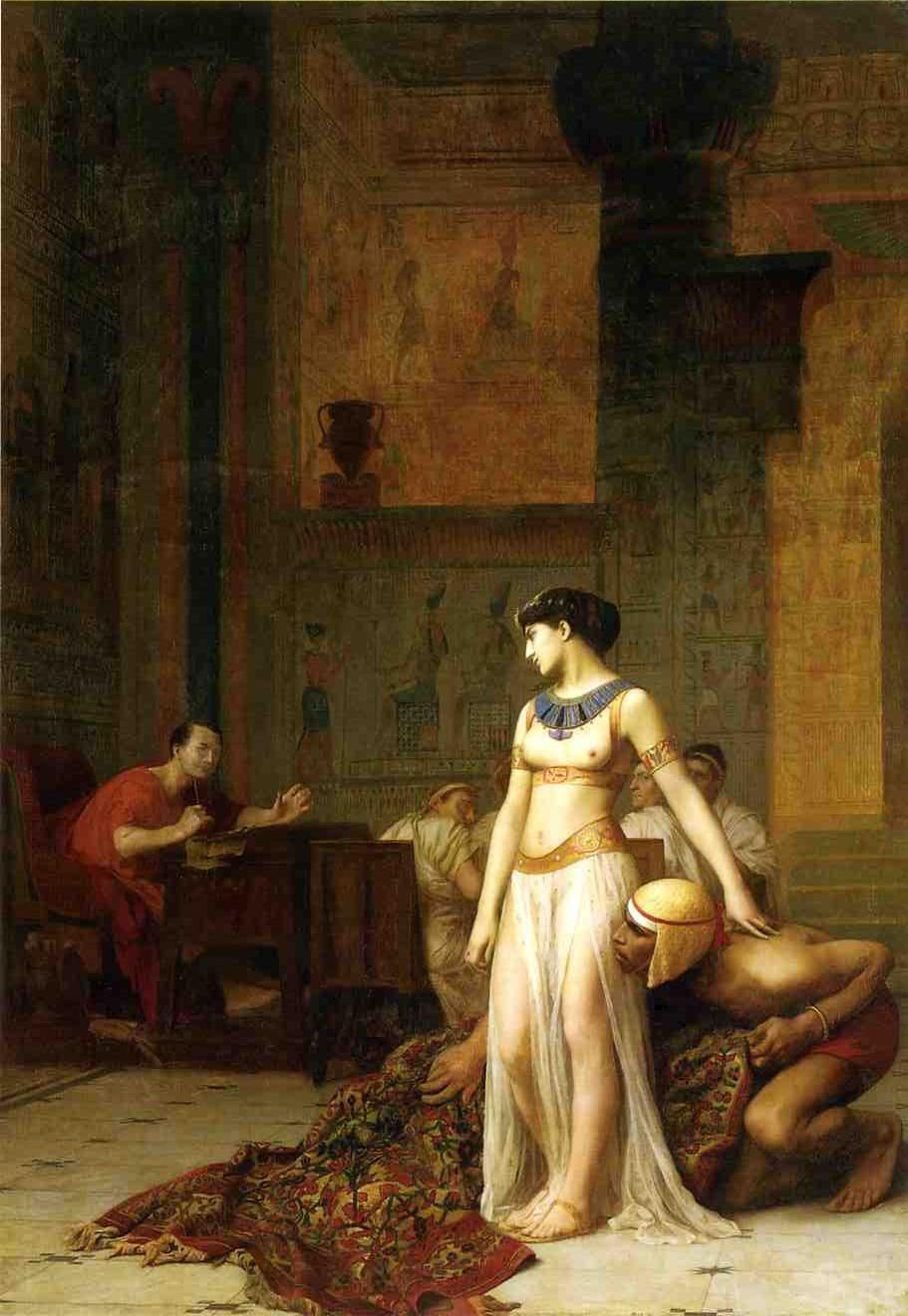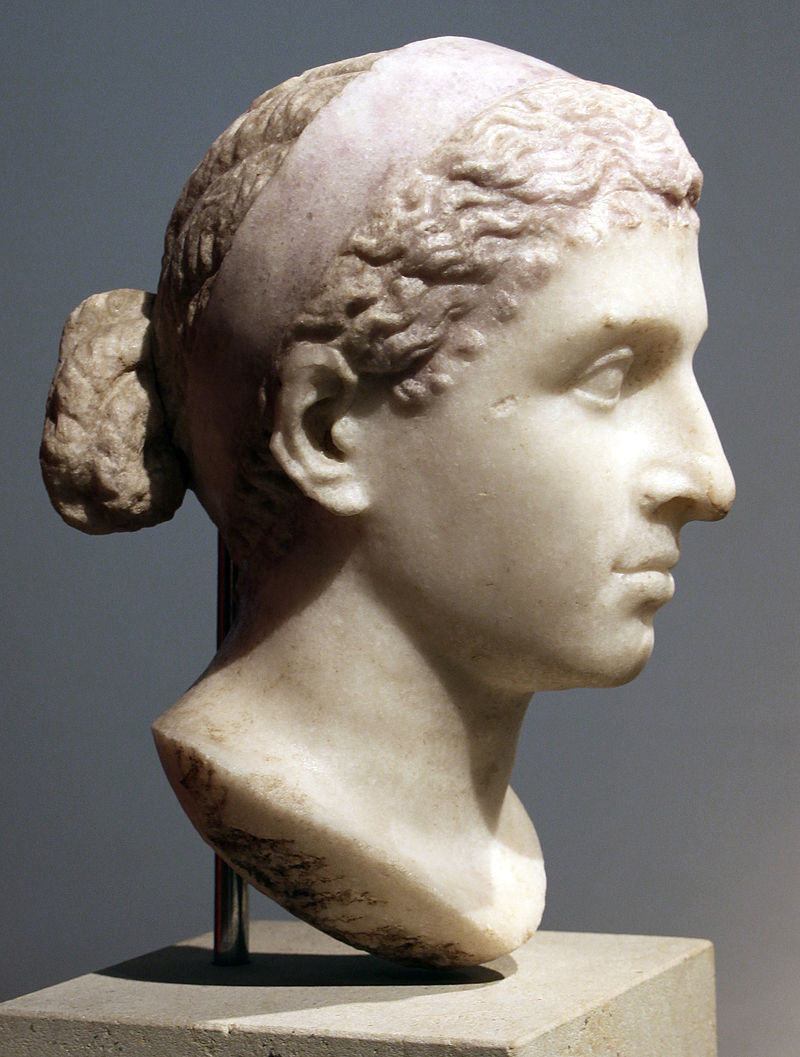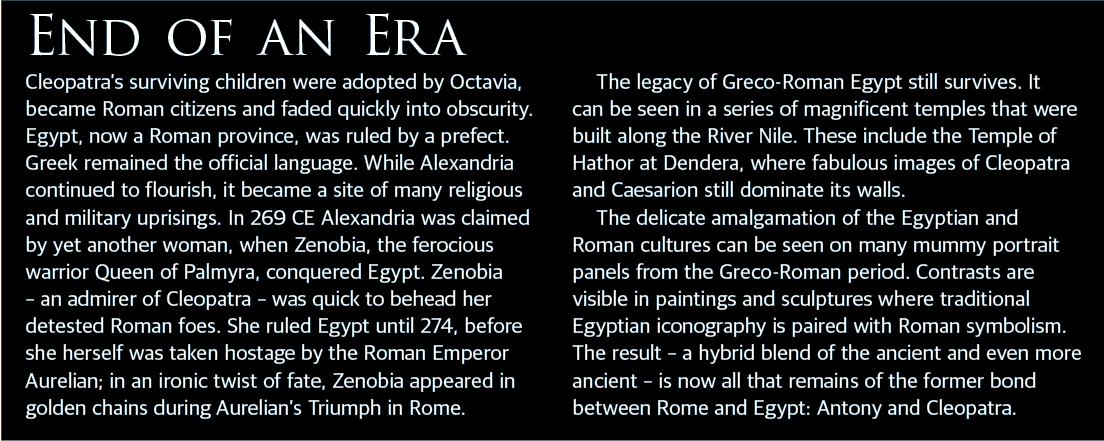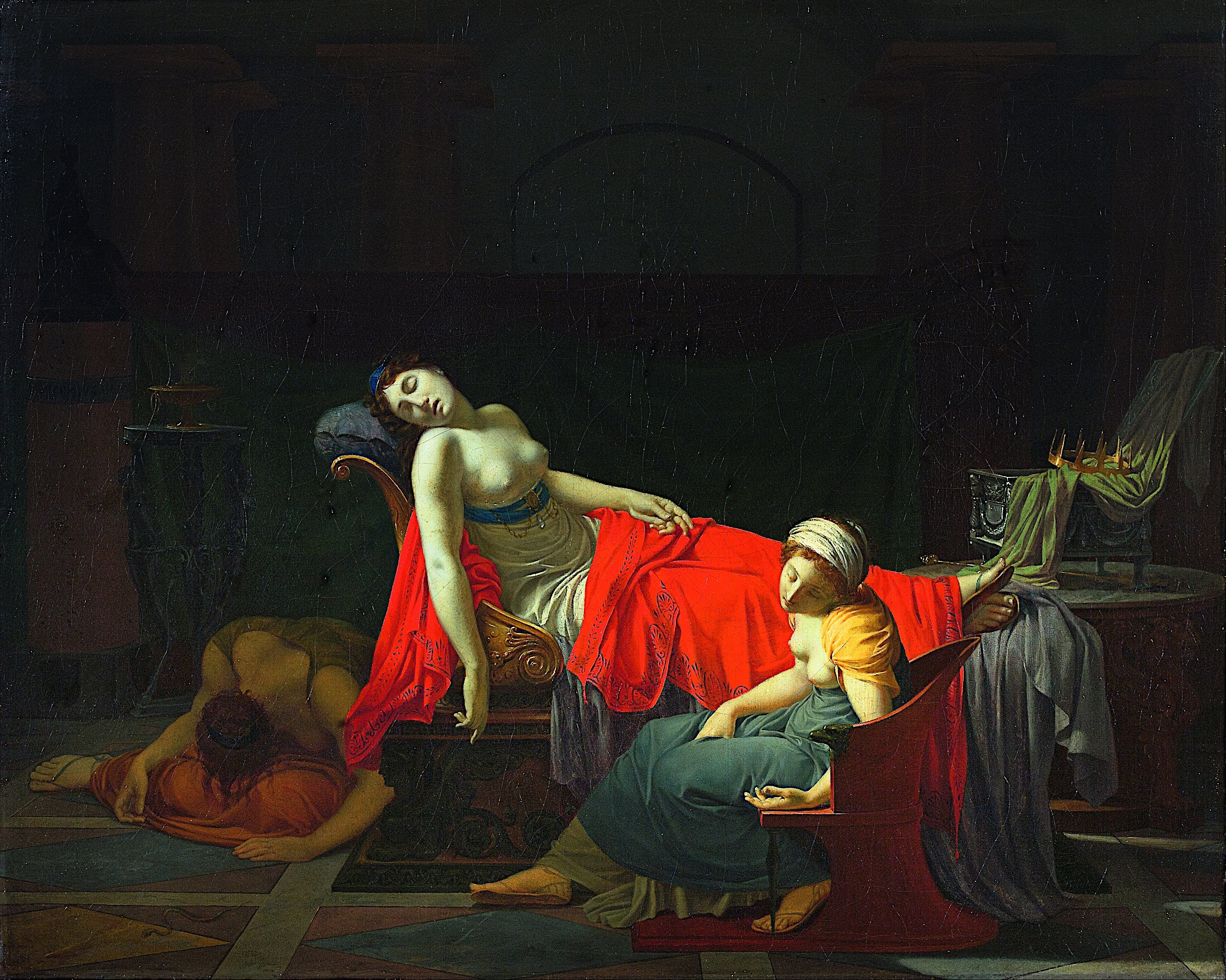Cleopatra VII remains an icon of both the ancient and modern world. Today, she continues to captivate and puzzle historians, remaining one of history’s most enchanting and enigmatic figures.
The alliance of Mark Antony and Cleopatra changed the face of the world. A coalition which began as a political statement soon evolved into a tumultuous, and later tragic, love affair.
Despite her florid reputation, Cleopatra took only two lovers – both were rulers of Rome. Cleopatra recognised Rome as the leading power of the ancient world. Egypt, rich in gold and grain, provided the material resources to fuel that power. Both affairs had begun with a political agenda. They had enabled the queen to establish a secure and profitable union between Rome and Egypt. Despite this, however, events took an unexpected turn when she met the younger general. Cleopatra and Mark Antony fell in love, embarking on a passionate and unpredictable relationship that brought both riches and remorse. Their partnership, as lovers and politicians, both immortalised and destroyed a dynasty – it brought to a close 3,000 years of pharaonic rule.
Long before her meeting with Mark Antony, the queen had borne a child to her first Roman lover, Gaius Julius Caesar and she had named the child Caesarion – ‘little Caesar’. In doing so, Cleopatra had secured for herself an enormous power base, for Caesar had no heir. Despite its material wealth, Egypt had suffered years of famine that had weakened the reserves of her granaries and her people. The country was in eclipse. Her allied states had also felt the grip of Rome tightening around their throats. Alexandria had long been important to Rome. As a gateway to the East, it was a major port with a large cosmopolitan community. It was renowned for its libraries, culture and trade. Egypt also had an abundant source of grain with which it fed its imperial army. On the other hand, the Romans regarded the Egyptian people and their religion with suspicion – its cults, along with its strange animal-headed gods, were an abomination to the refined Roman senses.
While her alliance with Rome continued, Cleopatra – and her throne – remained secure. For this reason, Cleopatra courted Rome and its leading figures. From the beginning, Cleopatra was an enigma to a man like Mark Antony. Having grown up in Rome, he was familiar with upper-class women who were cloistered in the home and whose only role in life was to be that of good wives and mothers. The women of Rome were largely regarded as vessels of chastity; Cleopatra was the antithesis of a Roman woman.

Growing up in a highly political and dangerous household where life was precarious, she was descended from a long line of rulers – all named Ptolemy – who could trace their line to Alexander the Great. In order to keep their bloodline pure, female rulers often married their brothers. This practice brought outward strength but inner conflicts; during her early life Cleopatra witnessed brutal power struggles within her own family. Indeed, as her power grew, she had no choice but to execute her rival siblings.
Cleopatra had to live by her wits. She was a highly educated woman with a sharp mind and a keen instinct. She spoke several languages, including Egyptian – making her unique among her peers. She was a cultivated woman, a patron of the arts and devoted to books. Despite her later reputation as a femme fatale, she was not considered beautiful. It was said she had a charismatic presence, was a fine conversationalist and had a sweet, seductive voice – a trait she may have cultivated as a child. Most importantly, Cleopatra was a survivor; she knew that in order to sustain her throne, she needed to control the might of Rome, and Mark Antony could offer this.
Mark Antony and Cleopatra were as fire and water. Born in January 83 BCE, Antony was a true son of Rome. Like Cleopatra, he sought decadence and danger – he had quickly gained a reputation for drinking and gambling, and seems to have been attracted to exotic religious cults. Later, he earned fame and fortune among the militia; as the commander of a cavalry regiment he received great honours fighting with Caesar’s armies in Gaul. Antony and Caesar formed a mutual friendship and a distant kinship had strengthened their alliance. As Caesar’s star ascended, so too had Mark Antony’s, and when the elder man became dictator, Antony was appointed Magister Equitum (Master of the Horse) and governed Rome in Caesar’s absence. Better suited to the battlefield, Mark Antony made an impetuous politician – highly volatile, his excesses in wine and women became the topic of much public gossip, for these often included affairs with other men’s wives.
After the assassination of Caesar, Cleopatra and Mark Antony fled Rome and Cleopatra returned to Egypt. With Caesar dead, her position had become tenuous. The Romans regarded a female ruler with abhorrence and she desperately needed an ally in the Senate. When revolt failed to materialise, Mark Antony returned to the Forum to find a city outraged at the atrocities that had befallen Caesar.
The assassins were executed or fell into obscurity, and it was left to Octavian (Caesar’s appointed heir), Lepidus (his trusted commander) and Mark Antony to calm the storm. The three men formed the Second Triumvirate granting themselves equal powers of government.
Antony was now in a strong position. As the three men began to carve out Roman territory each assigned themselves important provinces. Mark Antony had set his heart on Cleopatra and Egypt. He sent a message to his lover asking her to meet him at Tarsus in modern-day Turkey, determined to win her support for his military campaigns.
On this particular meeting she presented herself as the embodiment of the goddess Venus. The imperial queen of Egypt arrived on a golden barge; decked in fine linen and precious gems, she was attended by servants dressed as sea nymphs. While she drifted towards Mark Antony like a creature from myth, she refused to disembark. As queen of Egypt, she expected Antony to wait on her.
Mark Antony’s temper was inflamed, but so were his passions. Plutarch said of their relationship:
“Observing Cleopatra’s looks and her subtlety and tricky wit in conversation, he [Antony’s agent] at once knew that Antony would never think of doing such a woman any harm, and that in fact she’d have the greatest influence over him.”

Not surprisingly, Antony chose to spend the winter of 41–40 BCE with Cleopatra in Alexandria – the result of this visit was the birth of twin children, Alexander Helios and Cleopatra Selene II, whose names are linked with the dual powers of the Sun and the Moon.
Rome was greatly disturbed by this turn of events. In order to secure his loyalty, Octavian arranged a marriage between Mark Antony and his sister, Octavia – a move that infuriated the Egyptian queen. To avoid a public insult, Mark Antony stumbled into an acrimonious and dangerous union.
Meanwhile, the queen of Egypt financed his army, allowing him to capture Jerusalem where he installed Herod as the puppet king of Judaea. Four years later, Antony visited Alexandria again en route to make war with the Parthians. His relationship with Cleopatra had gathered momentum and he had made Alexandria his home. Despite his union with Octavia, he married Cleopatra and they had another child.
Soon, Antony grew tired of luxurious living, exotic palaces and hunting in the Egyptian Delta; he longed for the glories of war. When Antony invaded Parthian territory with an army of about 100,000 Roman and allied troops, the campaign proved disastrous. He never recovered from the shock of defeat. Octavian took this opportunity; he demoted Lepidus, belittled Mark Antony and seized unilateral power. He reminded Rome of the menacing relationship between Antony and his abominable foreign queen. While feigning shock at the abandonment of his sister, he told the citizens of Rome that Mark Antony was now living as an Egyptian; this was regarded as an act of treason.
Antony and Cleopatra responded to the attack with theatrics. After a successful invasion of Armenia, Mark Antony infuriated his fellow Romans by holding a Triumph (formal celebration) in the city of Alexandria. Mark Antony then issued a series of proclamations known as the Donations of Alexandria when he named Cleopatra and her children heirs to his conquered territories. It was, in effect, a declaration of war. Mark Antony named Caesarion the legitimate son and heir of Caesar – Octavian, of course, being the ‘adopted’ son of the former dictator. Octavian had no choice but to retaliate. He told the Senate that Antony had “gone native” and that he had been effeminated by the Egyptian queen. Mark Antony divorced Octavia and accused Octavian of forging Caesar’s will. Rome was drawn into a civil war – which culminated in the defeat of Antony at the Battle of Actium.
After his clear victory, Octavian returned to Rome. During the 12 months that followed, he left Antony and Cleopatra to contemplate their defeat and consider their demise. Egypt’s neighbouring territories were largely annexed to Rome; for this reason, Antony and Cleopatra’s attempts to regroup and raise an army proved futile.

It was in August 30 BCE that Octavian finally invaded Egypt. Antony made one last valiant attempt to usurp the Roman leader, but in the end, his fate had been cast. He did what was required of all honourable Roman soldiers and fell upon his sword. In an attempt to safeguard her children Cleopatra made a tentative effort to make terms with Octavian. In his final hour, Antony was brought to Cleopatra’s mausoleum and he died in her arms. Octavian allowed Cleopatra to conduct burial rituals for Antony’s body. While he presented an outward show of friendship, he naturally wanted her dead. He was, in fact, in a difficult position.
Roman law dictated that Cleopatra should be treated as an enemy of the state. She should be taken back to Rome in shackles and paraded before the mob. However, a female ruler was a rare entity – the display could end up backfiring on Octavian and prove highly distasteful.
He was relieved then, when Cleopatra took the courageous decision to end her own life. Some historians believe that she was bitten by a snake hidden in a fig basket. Others suggest that she drank wine laced with hemlock. An account of her death can be found in Plutarch’s Lives:
‘The messengers [of Octavian] came at full speed, and found the guards apprehensive of nothing; but, on opening the doors, they saw her stone-dead, lying upon a bed of gold, set out in all her royal ornaments. Iras, one of her women, lay dying at her feet, and Charmion, just ready to fall, scarce able to hold up her head, was adjusting her mistress’s diadem. And when one that came in said angrily, “Was this well done of your lady, Charmion?” “Extremely well,” she answered, “and as became the descendant of so many kings”. As she said this she fell down dead by the bedside.’
In Rome, the son of the orator Cicero announced the deaths of Antony and Cleopatra with relish. Mark Antony was stripped of his accolades, his image erased from coinage and his statues removed. Under threat from Octavian, Iullus Antonius – Mark Antony’s eldest son – later committed suicide. Concurring with Homer – that “It is bad to have too many Caesars” – Octavian also had Caesarion murdered. The remaining children of Cleopatra and Antony were spared and taken to Rome where they were adopted by Antony’s family.
With the death of Cleopatra, the Sun had finally set on the Hellenistic Dynasty – and indeed on the 3,000-year rule of the pharaohs.

Bridget McDermott is the author of Death in Ancient Egypt and Warfare in Ancient Egypt. For more on the incredible figures of the ancient world, subscribe to All About History from as little as £13.
